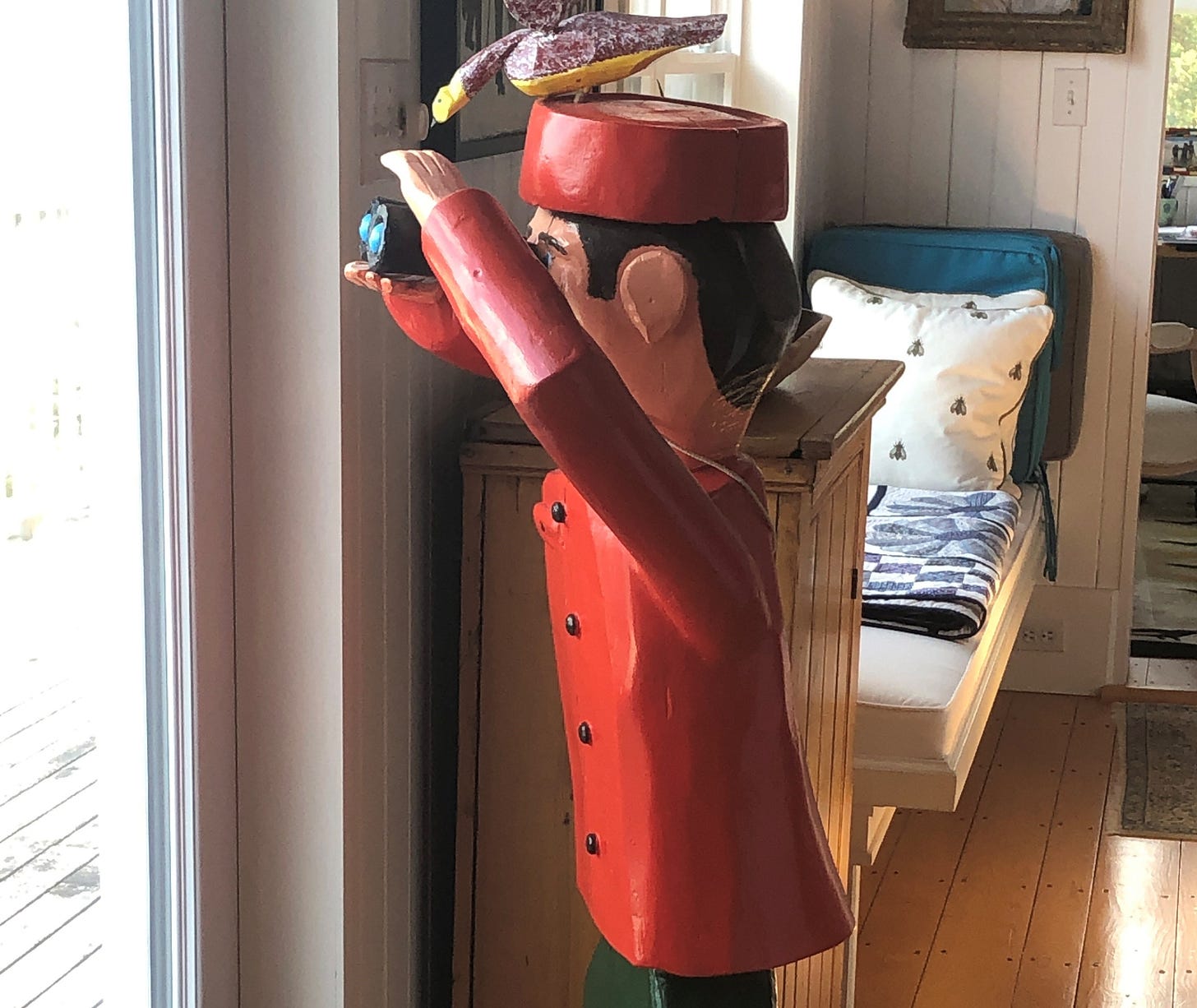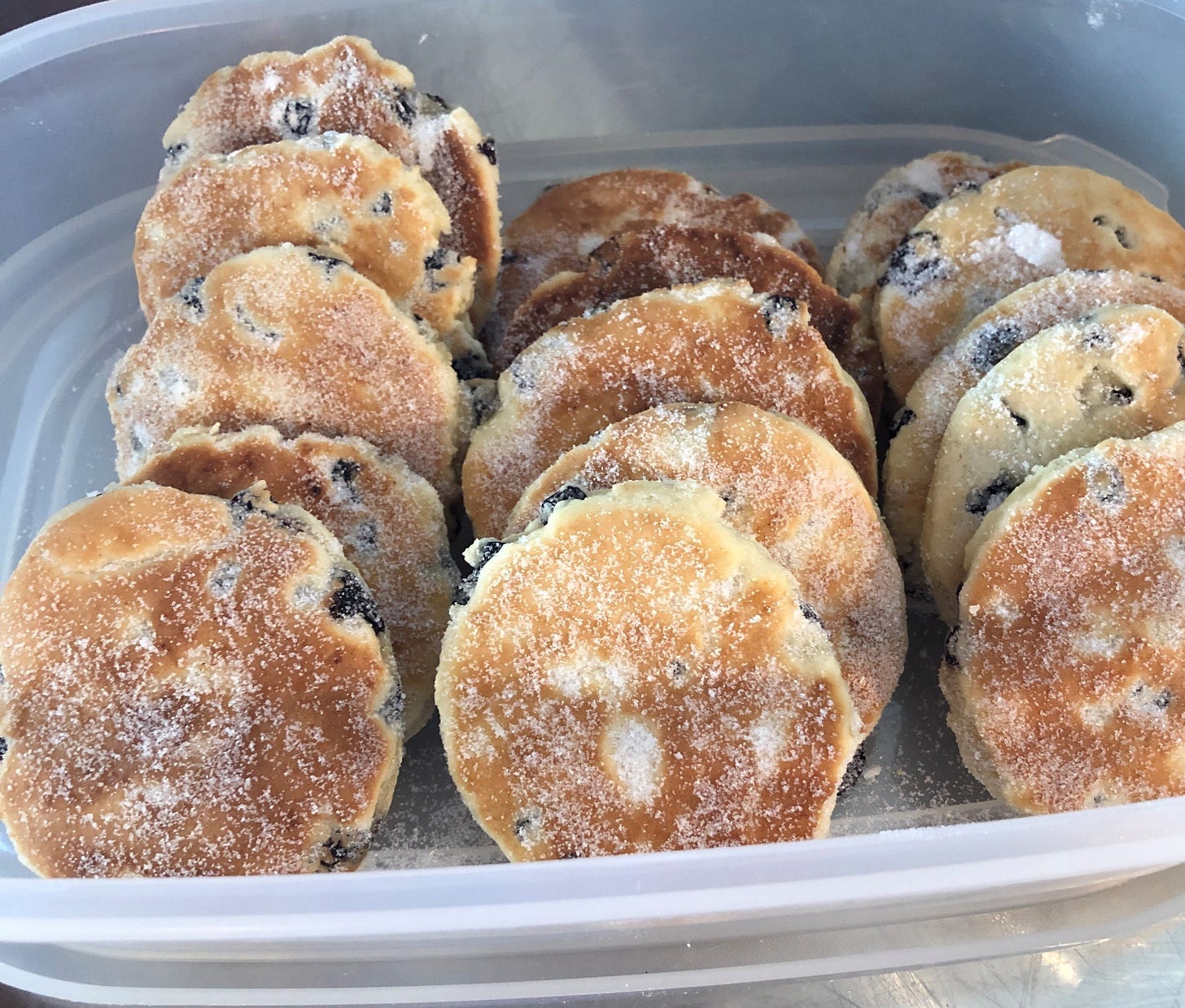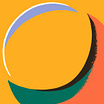Ransford Naughler’s “The Bird Watcher” Photo by author.
Our home is filled with an eclectic collection of art. It includes many whimsical pieces of Nova Scotia Folk Art. Perhaps the piece that best reflects how my life is unfolding is Ransford Naughler’s “The Bird Watcher.”
He stands gazing out to sea, searching for birds as he peers through his binoculars. He’s oblivious to a bird perched on his head, peering down.
Cold weather and fatigue often keep me trapped inside, and like the birdwatcher, I often find myself gazing out to sea. The constant movement of the waves and the frequent appearances of loons, seagulls, ospreys, eagles and hawks, to name the few birds I can identify, help distract me from all the physical manifestations of chemotherapy that seem to be increasing as the weeks of treatment go by. It’s a momentary balm, and every moment that takes me away from the side effects is appreciated.
I have to confess: my treatments are more like going to a spa than anything else I can use as a comparison. It’s what happens in the days following treatment that are challenging, and lately, those days have been more difficult.
Last week was the most challenging to date, with little reprieve before it was time to head back for another treatment. My energy plummeted to new lows, and my spirits followed suit. I confessed to Tony that I didn’t know if I could continue, and my tears were frequent and copious.
I knew that my misery was incredibly hard for him to witness and that he was suffering as much and perhaps more than me. Fortunately, after my Tuesday morning drug of choice — a very strong black coffee, my mood changed and the depression lifted. I knew I could face more treatment. Tony and I took a short walk, both of us heartened the tide had turned and a small amount of energy and resilience was back in place.
The treatment room is small, spotless, staffed with kind and compassionate nurses, and eight very comfortable lazy-girl chairs that I now know how to thrust back into a horizontal position. On most Wednesdays, only three or four patients fill the space, and the room is quiet and serene. My terror of being in a hospital, any hospital for that matter, and my white-coat syndrome are gradually diminishing with the help of meditation and breathing exercises and the knowledge that nothing hurts. Progress is measured by the many times my blood pressure is taken. In the first couple of months, it was ridiculously high at first measurement and dropped considerably at the end of the session. Yesterday it was reasonable both upon entering and just before leaving. Progress.
During my treatment yesterday, I thought of my mother, who cared for my young children and me whenever we visited her in Nova Scotia in the early years when we lived in Ontario. Michael was the most active baby, toddler, and child I’ve ever known, and he matched my mother’s incredible energy and often exceeded it. Kate remained my quiet, undemanding child. I regressed on those visits home and depended on my parents to look after the children and give me a week of respite from the action-packed and challenging weeks of motherhood typical of life far away in Ontario.
Before we arrived, my mother would call to say that she was counting the days. After one typically eventful week that included at least two phone calls to the Poison Control Centre, she drove us to the airport and said, “Well darling, I love you all very much, but if your plane is one minute late, I’m gonna shoot myself!” We had a good laugh, and I appreciated that she really understood the challenges I faced.
The big news of the past week, and it’s not been a particularly great one, is that we have said “Good Bye” to “Hello Fresh.” I watched Tony grow pale when I suggested that he might like to try cooking one last Go Fresh meal so that I could document the historic event with photos. This wonderful man, my loving and compassionate caregiver, just couldn’t bring himself to attempt this.
We went for a brief walk today, and I asked him a few questions about the dates of his last dalliance with a stove.
As far as I can ascertain, Tony’s cooking career ended long before we were married. He did eat meals at home from time to time — frozen lasagnas and meat pies were his favourites. He enjoyed a big hot meal served at lunch, provided to teachers free of charge at the private school where he taught. If heating up a frozen entree was too taxing, pubs and Swiss Chalet beckoned, and weekend breakfasts, the full English with endless cups of tea, were served at the local diner. He loved that the waitress didn’t even bother asking him what he wanted.
On Monday, when I had a brief surge of energy, I mixed the dough for Tony’s beloved “Welsh Cakes,” a currant-studded dough cooked on the stovetop, much like a griddlecake. Not sure why, but these confections last forever and are Tony’s favourite treat with coffee mid-afternoon. This morning, while my energy made a brief reappearance, I rolled, cut, and cooked them for him.
What can I say but that it gives me immense pleasure to be able to do this for him. Who cares for the caregivers? They are the unsung heroes of the cancer journey.
I never lose sight of how lucky I am to have the circle of support that shields me, comforts me, loves me, and brings or sends food, books, flowers, treats, and other treasures.
Until next time,
B. ❤️







